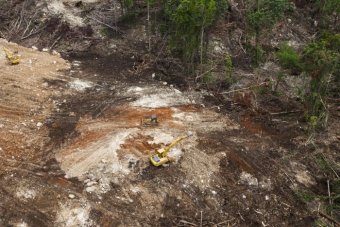
Source: Radio New Zealand
Originally aired on Thursday 16 Oct 2014
Calls continue for Papua New Guinea police working for logging companies to be removed amid unresolved claims of police brutality against landowner communities opposed to logging.
Allegations by some East New Britain landowners that they were intimidated and assaulted among other abuses by police attached to a logging company remain unresolved.
The report of the 'Investigation of Police Brutality - West Pomio', compiled by the Eco-Forestry Forum was finished last year but never published.
Johnny Blades has more:
The findings in the Pomio report centre around police brutality taking place on behalf of a company called Gilford, a subsidiary of Malaysian logging giant Rimbunan Hijau. The loggers appear to not only pressure locals through violence to stop protesting against or obstructing the project, they also heavy them into signing on to allow the loggers to keep plundering their forests. The New Guinea Islands regional police commander Anton Billie says police investigations have found little basis to these allegations. But he admits that police are working with logging companies on the request of the provincial government.
ANTON BILLIE: The provincial government is trying to see development taking place all around the province so they've made an argument to the provincial government on behalf of the people and the company and developers to develop the place so that's why the provincial government request the police presence because they want development to take place.
Many Pomio locals hope that the land lease in question will be revoked by the national government which recently signalled it would cancel the many leases around PNG fraudulently obtained by loggers. However, the Forestry Minister Douglas Tomuriesa says unfortunately the West Pomio lease was acquired legally and there is nothing he can do to stop it. But he says authorities are identifying police who brutalise locals opposed to logging.
DOUGLAS TOMURIESA: We do have rogue policemen around who are paid by the companies to look after their interest. And we are working very closely with our stakeholders to make certain that we do not allow these so called police to interrupt in the operations of the logging areas.
Last year, the Police Commissioner ordered all officers working for loggers to remove themselves from the logging camps. The Governor of Oro Province, Gary Juffa, who has been taking steps to remove illegal logging operations from his province, says that while a number of these police did withdraw, they've since gone back.
GARY JUFFA: Nobody is able to go out and monitor these areas and see whether or not those instructions are being implemented or concealed, and a lot of the policemen out there, reserve policemen, auxiliary policemen, that are paid for by the logging companies to be there and they use the police uniform and the weapons to basically suppress the people into submission on behalf of the logging companies. And now we are starting to remove all of them in our province, the logging companies, that are illegally operating, and we are trying to say that this issue needs to be given some attention and the police have to remove these people.
While the use of police to protect major resource projects in PNG is long-established, the legal framework around it remains vague. Gary Juffa says the government may need to establish a national agency to provide such services instead of letting the role of police continue to be compromised
- Elizabeth1's blog
- Log in to post comments
